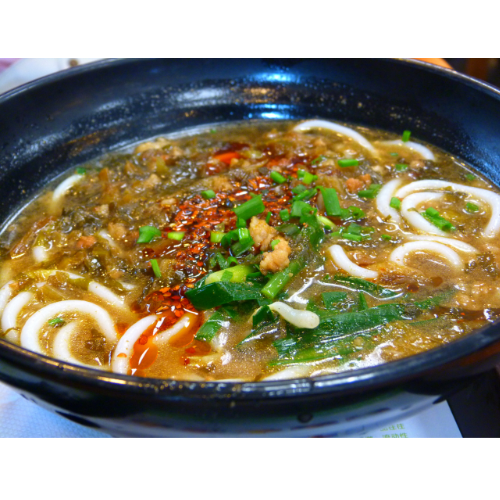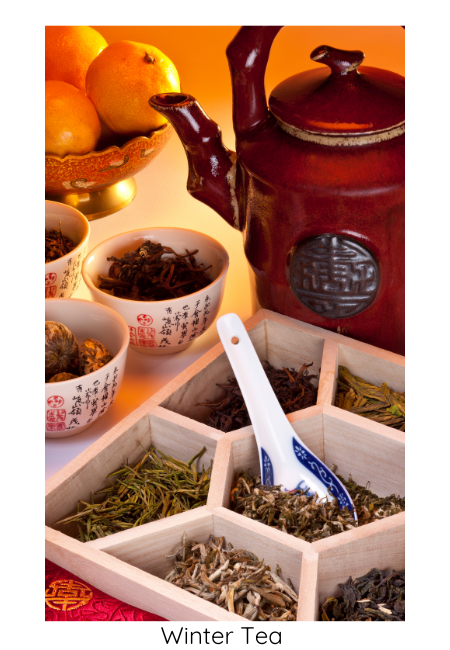Why Your Grandmother’s Soup Was Smarter Than Modern Energy Drinks
(And Why Fall Is the Season to Bring It Back with Chinese Herbs)

Why Grandma’s Soup Still Wins Over Energy Drinks
If you’re looking for steady energy this fall, skip the caffeine crash. In Traditional Chinese Medicine (TCM), soups and broths are the ultimate seasonal food for autumn because they warm digestion, moisten dryness, and naturally support the lungs and immunity. Unlike energy drinks, which jolt your system with sugar and stimulants, herbal soups deliver balanced, long-lasting vitality — comfort food that also functions like daily wellness.
The secret? Simple herbs like Astragalus, Codonopsis, Goji Berries, and Red Dates — ingredients you can add to any broth for nourishment that actually lasts.
In Traditional Chinese Medicine (TCM), the seasons are not just a backdrop — they directly influence how your body feels and functions. Autumn, in particular, is associated with the Lung and Large Intestine systems. The Lungs are thought to govern breath, immunity, and the delicate balance of moisture in the body, while the Large Intestine plays a central role in letting go of what no longer serves you — both physically and emotionally.
As the air becomes cooler and drier, these organ systems are especially vulnerable. Dryness can irritate the throat, skin, and sinuses, weaken defenses against seasonal bugs, and even lead to sluggish digestion or constipation. This is why so many people feel a dip in energy, immunity, and overall vitality when fall arrives.
 Soups and broths are considered the ultimate seasonal foods in this context because they are warm, moistening, and easy to digest. The warmth supports the Spleen and Stomach (the digestive “center” in TCM), ensuring you continue to extract energy efficiently from food. The liquid replenishes fluids lost to dryness, while gentle, slow cooking allows nutrients and herbs to harmonize into a form that the body can readily absorb.
Soups and broths are considered the ultimate seasonal foods in this context because they are warm, moistening, and easy to digest. The warmth supports the Spleen and Stomach (the digestive “center” in TCM), ensuring you continue to extract energy efficiently from food. The liquid replenishes fluids lost to dryness, while gentle, slow cooking allows nutrients and herbs to harmonize into a form that the body can readily absorb.
Contrast that with energy drinks: the sugar and caffeine shock the system, depleting Yin (moisture, fluids) while overstimulating Yang (active energy). In other words, they borrow against tomorrow’s reserves without actually restoring today’s.
A warm bowl of soup, especially one enhanced with Chinese herbs, does the opposite. It moistens the Lungs, supports digestion, and fortifies immunity, providing not just energy but balance. Instead of forcing alertness, it restores your reserves so you feel naturally vital and resilient.
It’s comfort food, yes — but also functional nourishment that aligns with the season and protects your most vulnerable organ systems.
The Herbal Advantage: Energy Without the Crash
Chinese herbs can elevate a simple broth into a bowl of wellness. Here’s how each adds both taste and benefit:
-
Astragalus Root (Huang Qi) – Slightly sweet and earthy; traditionally used to strengthen Qi (vital energy) and fortify resilience as the seasons change.
-
Codonopsis (Dang Shen) – Mild and smooth, it supports stamina and digestion gently, without the overstimulation of caffeine.
-
Goji Berries (Gou Qi Zi) – Add a subtle fruity sweetness and plump up into soft, chewy bites; long valued for nourishing vitality and eye health.
-
Chinese Red Dates (Da Zao) – Sweet and caramel-like; enrich the blood, calm the spirit, and give the broth a naturally rich flavor.
Together, they create a broth that tastes like comfort and delivers real energy — steady, grounded, and lasting.
 Recipe: Grandma’s Broth
Recipe: Grandma’s Broth
Bring this tradition into your kitchen with a recipe that’s as easy as it is nourishing.
Ingredients:
-
1 whole chicken (or 2–3 pounds bone-in pieces)
-
3 slices fresh ginger
-
10g Astragalus root (Huang Qi)
-
10g Codonopsis (Dang Shen)
-
6–8 Chinese red dates (Da Zao)
-
1 handful goji berries (Gou Qi Zi)
-
Salt and scallions to taste
Directions:
-
Rinse the herbs quickly in cool water.
-
Place chicken, ginger, and herbs in a large stockpot with 10–12 cups of water.
-
Bring to a boil, skim foam, then simmer gently for 2–3 hours.
-
Strain (if desired), season with salt and scallions, and serve warm.
Shortcut option: Toss the herbs into store-bought bone broth and simmer 30 minutes, or pressure cook everything in an Instant Pot for 45 minutes. Either way, you’ll have a deeply nourishing soup without hours of waiting.
Bonus Recipe
Recipe 2: Warming Mushroom & Herb Immune Soup
(A Rich, Earthy Broth for Autumn Vitality)
While the first recipe focused on sweet, Qi-strengthening tonics, this one highlights warming, earthy herbs and mushrooms that support the immune system, digestion, and overall resilience as colder days set in.
Ingredients:
-
8–10 dried Shiitake mushrooms (or a mix of shiitake, reishi, or maitake)
-
1 piece Dang Gui (Angelica sinensis, 6–9g) – adds depth and supports blood circulation
-
6–8 slices Huang Jing (Polygonatum root, 10–15g) – moistens dryness and strengthens Yin
-
10g Fu Ling (Poria mushroom) – supports digestion and drains dampness
-
1 piece Chen Pi (Aged tangerine peel, 3–6g) – adds fragrance, reduces phlegm, aids digestion
-
2 carrots, cut into chunks
-
1 onion, quartered
-
2–3 garlic cloves, smashed
-
10–12 cups vegetable or chicken stock
-
Sea salt, pepper, and fresh parsley or cilantro to garnish
Directions:
-
Rinse the herbs and mushrooms lightly. Soak shiitake for 15 minutes if very dry.
-
Add stock, mushrooms, herbs, onion, carrots, and garlic to a large pot.
-
Bring to a boil, skim foam, then simmer 2–3 hours on low heat.
-
Season to taste with salt and pepper. Remove woody herb pieces before serving.
-
Garnish with parsley or cilantro.
Why These Herbs?
-
Dang Gui (Angelica root) – Known as the “female ginseng,” it supports healthy circulation and is especially useful for blood nourishment during seasonal changes.
-
Huang Jing (Polygonatum root) – Moistens dryness caused by autumn air, replenishes Yin, and supports gentle energy.
-
Fu Ling (Poria mushroom) – Helps digestion, drains excess dampness, and calms the mind.
-
Chen Pi (Aged tangerine peel) – Adds a citrusy aroma, harmonizes the formula, and eases digestive sluggishness.
-
Shiitake & Reishi mushrooms – Modern research highlights their immune-supporting compounds, while TCM values their ability to strengthen Qi.
The Case for Soup
Pros of Grandma’s Soup
-
Nutrient-Dense: Soups made with vegetables, herbs, and slow-simmered broths provide vitamins, minerals, and amino acids your body can actually use.
-
Sustained Energy: Complex carbs, protein, and healthy fats release energy steadily—no sudden spikes or crashes.
-
Hydration & Electrolytes: Broth-based soups hydrate while replenishing electrolytes naturally.
-
Digestive Support: Warm liquids and herbal ingredients are gentle on the stomach and support digestion.
-
Whole Food Nutrition: Soup is closer to nature—nothing artificial, no neon colors, no lab-made stimulants.
-
Comfort & Tradition: Beyond the nutrients, soup carries emotional nourishment—calming, warming, and connecting us to family traditions.
Cons of Soup
-
Less Portable: Not as easy to grab-and-go as a can.
-
Preparation Time: Soup requires cooking, simmering, or reheating.
-
Lower “Immediate Kick”: Soup won’t deliver the instant jolt that caffeine and sugar do.
The Case Against Energy Drinks
Pros of Energy Drinks
-
Convenience: Pre-packaged, shelf-stable, easy to carry.
-
Quick Stimulation: High caffeine content provides a rapid boost in alertness.
-
Perceived Performance Boost: Some people feel sharper or more energetic in the short term.
Cons of Energy Drinks
-
Energy Crash: Sugar and caffeine spikes often lead to fatigue and irritability later.
-
Hidden Ingredients: Artificial sweeteners, preservatives, and stimulants strain the body long-term.
-
Heart & Blood Pressure Risks: High caffeine can cause jitters, rapid heartbeat, and raise blood pressure.
-
Sleep Disruption: Consumed too late, they interfere with natural rest cycles.
-
Nutrient Void: Energy drinks provide empty calories and stimulants without real nourishment.
Bottom Line
Grandma’s soup is the slow, steady, nourishing path to true energy and wellness. Energy drinks may provide a quick kick, but they take more than they give—leaving your body drained, not restored.
The Experience
This soup is rich, earthy, and grounding. The mushrooms bring a deep umami flavor, while Chen Pi adds a light citrus note that keeps the broth from feeling heavy. It’s the kind of soup that makes you feel rooted and nourished — perfect for crisp evenings when your body craves warmth and resilience.
Pro Tip: Make a big pot, freeze extra portions, and you’ll always have a bowl of functional nourishment on hand when you’re tempted by a quick caffeine fix.
Personal Note:
On a personal note, in our home we like to freeze-dry our soups. It makes them easy to store, easy to reheat, and just as delicious as the day they were made. The flavor of the herbs — especially the sweet goji berries and rich red dates — holds up beautifully.
Another bonus? I buy chicken and fresh produce when it’s on sale, cook a big batch with the herbs, and freeze-dry portions for later. It saves money and means we always have nourishing, herbal broth ready whenever we need it — no cans, no caffeine, just comfort and steady energy in a bowl.
 Why Fall Is the Perfect Time
Why Fall Is the Perfect Time
In Traditional Chinese Medicine (TCM), each season is linked to an organ system and an elemental quality. Autumn belongs to the Lung system and the Metal element. The Lungs are said to “govern Qi and respiration” — they’re the gatekeepers of the breath and also play a vital role in immunity and skin health. Because the Lungs are delicate and easily affected by dryness and cold, this is the time of year when coughs, sore throats, and lowered resistance to seasonal bugs often appear.
The climate shift into autumn brings:
-
Cooler winds and dryness → sapping moisture from the lungs, throat, and skin.
-
Earlier nights and shorter days → naturally lowering energy reserves.
-
Seasonal transitions → challenging digestion and immunity as the body adapts.
This is why TCM emphasizes foods that are warm, moistening, and easy to digest in the fall. Herbal broths do exactly that:
-
They moisten dryness (think goji berries, red dates, and Huang Jing).
-
They warm the core without overstimulation (gently simmered chicken, ginger, astragalus).
-
They support immunity by strengthening Lung Qi and harmonizing digestion.
Contrast this with an energy drink. Sugar and caffeine push your system to burn faster, dehydrating the body and straining your reserves. Instead of building resilience, they drain it. The result? More dryness, more fatigue, and a greater crash when the jolt wears off.
A seasonal approach, rooted in TCM, works in harmony with your body’s rhythms. By eating in alignment with autumn’s needs, you cultivate steady vitality, clear breath, stronger defenses, and the warmth to transition smoothly into winter.
In short: Herbal soups aren’t just food. They’re seasonal protection, comfort, and medicine disguised as nourishment.
TCM Insight: Why Fall Calls for Soups & Herbs
| Category | Autumn Insight |
|---|---|
| Seasonal Organ | Lungs & Large Intestine |
| Element | Metal |
| Climate Factor | Dryness |
| Common Challenges | Sore throat, cough, fatigue, dry skin, sluggish digestion |
| Emotional Theme | Letting go, grief, reflection |
| Best Foods | Warm soups, moistening herbs, easy-to-digest broths |
| Soup Benefits | Moistens dryness, strengthens Lung Qi, warms digestion, supports immunity |
In TCM, eating in alignment with the season is one of the simplest ways to stay balanced. Autumn is the time to nourish your Lungs, protect against dryness, and build energy reserves before winter sets in.
Imagine This at Your Table
Picture yourself ladling out steaming bowls on a crisp October evening. Your kids slurp up the sweet goji berries. Your partner comments on the rich flavor of the broth. And you? You notice that instead of the shaky buzz of an energy drink, you feel calm, steady, and satisfied — with energy that lasts all evening.
Grandma would be proud.
A Tradition Rooted in Folklore
For centuries, Chinese families have kept a few herbs on hand for the changing seasons. Astragalus roots would sit in jars in the kitchen, red dates stored alongside rice, ready to be tossed into soups. These weren’t exotic remedies — they were everyday staples, the “secret ingredient” to meals that kept families nourished through long winters.
Try It Yourself: The Fall Soup Energy Pack
Not sure where to start? We’ve bundled Astragalus, Codonopsis, Goji Berries, and Chinese Red Dates into our Fall Soup Energy Pack — the exact herbs you need for this recipe.
With one click, you’ll have everything ready to simmer your first pot tonight. No guesswork, no overwhelm — just a tradition brought back to life in your kitchen.
The Takeaway
Grandma’s soup wasn’t just dinner; it was wisdom in a bowl. This fall, skip the cans of energy and revive a tradition that fuels your body the way nature intended — slow, steady, and deeply satisfying.
Because sometimes, the smartest solutions aren’t the newest ones. They’re the ones your grandmother already knew.

